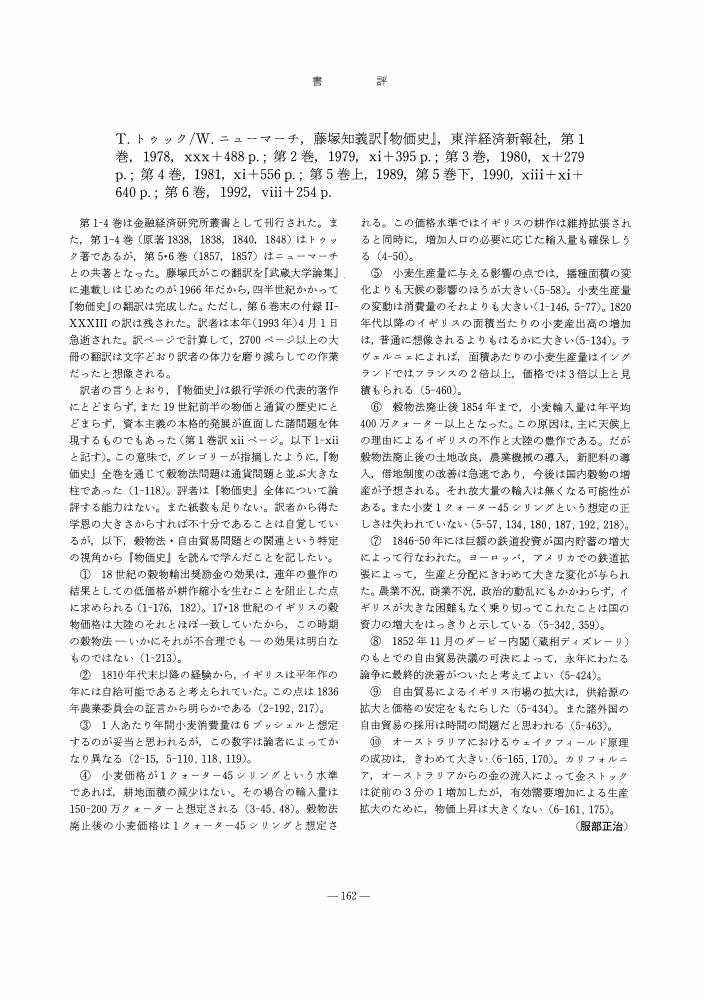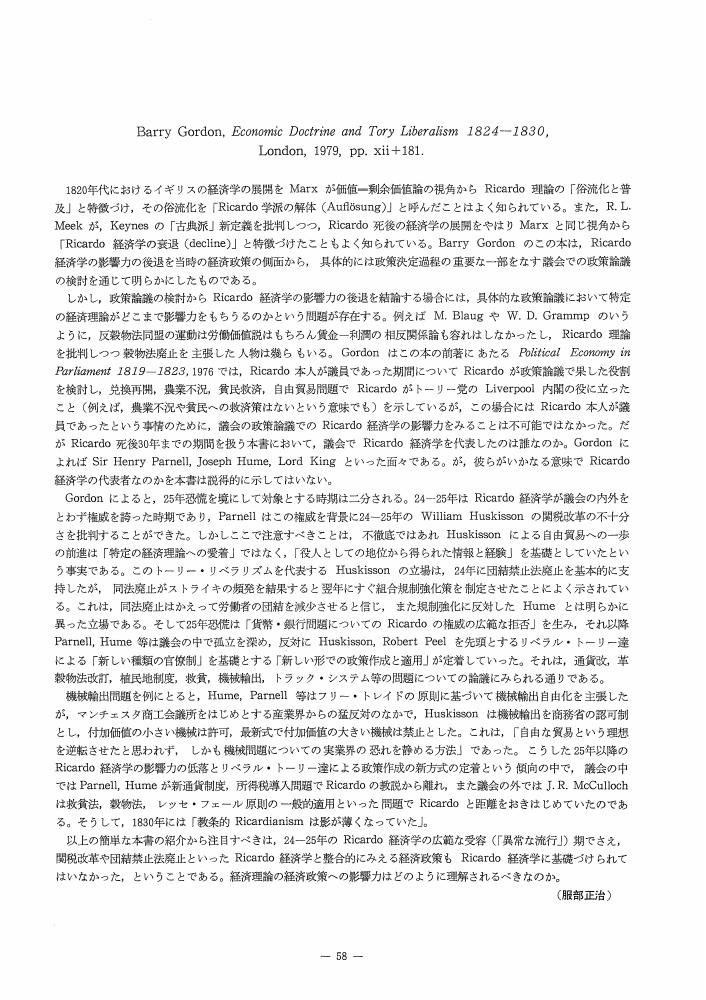13 0 0 0 OA ジョン・ボイド・オールの食料政策論(中)
- 著者
- 服部 正治 ハットリ マサハル Masaharu Hattori
- 雑誌
- 立教經濟學研究
- 巻号頁・発行日
- vol.67, no.2, pp.27-59, 2013-10-18
1 0 0 0 OA ジョン・ボイド・オールの食料政策論(下)
- 著者
- 服部 正治 ハットリ マサハル Masaharu Hattori
- 雑誌
- 立教經濟學研究
- 巻号頁・発行日
- vol.67, no.3, pp.67-97, 2014-01
1 0 0 0 OA ジョン・ボイド・オールの食料政策論(上)
- 著者
- 服部 正治 ハットリ マサハル Masaharu Hattori
- 雑誌
- 立教經濟學研究
- 巻号頁・発行日
- vol.67, no.1, pp.17-43, 2013-07-19
1 0 0 0 OA 「国富論」における歴史批判(1973)
- 著者
- 服部 正治 Robert Chapeskie 小林 昇
- 出版者
- The Japanease Society for the History of Economic Thought
- 雑誌
- 経済学史研究 (ISSN:18803164)
- 巻号頁・発行日
- vol.59, no.1, pp.63-90, 2017 (Released:2019-09-01)
Introduction by Masaharu Hattori The late Noboru Kobayashiʼs “Historical Critique in Wealth of Nations: A Per-spective on Books III and IV,” translated here into English, was originally pub-lished in Japanese in Fukushima Universityʼs Shōgaku Ronsyū (The Journal of Commerce, Economics and Economic History), Vol. 41, No. 5, 1973, and re-printed in Volume 2, which is indicated as 《II》 in this translation, 1976, of The Works of Kobayashi Noboru on the History of Economic Thought, 11 Volumes, 1976-1989, Tokyo: Miraisha. The “Historical Critique” of the title of this article has a double meaning when it comes to its content. In one sense, it refers to Smithʼs criticism of history that goes against the natural progress of opulence and has been seen in Europe “after the fall of the Roman Empire” that is de-scribed in Book III of Wealth of Nations. In another sense, it refers to Kobaya-shiʼs criticism of the defect inherent in Smithʼs historical understanding. When it comes to the latter, Smith did not sufficiently recognize the historical fact that the mercantilist protectionism of the Government of the civil revolutions (par-ticularly the Glorious Revolution) in Britain protected and fostered the devel-opment of domestic industrial capital, bringing about the bi-polar separation of independent producers that advanced the development of the primitive accumu-lation of capital and eventually led to the establishment of the capitalist system. Kobayashiʼs historical critique can thus be summarized as pointing out Smithʼs flawed understanding of the historical significance of mercantilism.
- 著者
- 服部 正治
- 出版者
- The Japanease Society for the History of Economic Thought
- 雑誌
- 経済学史研究 (ISSN:18803164)
- 巻号頁・発行日
- vol.54, no.1, pp.1-21, 2012 (Released:2019-08-22)
Abstract: This paper explores the core of the late Noboru Kobayashiʼs scholarship on the histo-ry of economic thought. Kobayashiʼs main research topics are British mercantilism, Adam Smith and Friedlich List. For him, these topics are not independent subjects, but integrated into a single theme. By examining the national and historical charac-ters of Britainʼs and Germanyʼs economics, he tried to elucidate the structures of their economies from the viewpoint of the generation of modern productive powers. He called the unique methodology of his study the “heuristic reciprocation between the history of economic thought and economic history.” Kobayashi clarified that Smithʼs misunderstanding of mercantilism caused a basic defect in his historical recognition of the formation of British capitalism, and that the foundation to Listʼs criticism of Smith arose from this defect. The idiosyncratic points of Kobayashiʼs study are as follows. First, from the view-point of the developing stages of economic theory, Steuartʼs Principles and Smithʼs Wealth of Nations are defined as a general theory of primitive accumulation and a system of capitalist accumulation, respectively. Second, a common feature among the above two works is the economics of affluence, and Steuartʼs Principles can be de-fined as the first system of political economy. Third, Tuckerʼs gradual shift toward economic liberalism coexisted with his consistent political conservatism. Fourth, Listʼs relatively neglected work, Land System, is the key to understanding his social science. He proposed expansionistic policies toward Hungary and the Balkans to cre-ate middle-scale farms as a domestic market for the protected industrial power. In his later years, worrying about the fact that postwar Japan “has amassed an enor-mous GNP at the cost of balance in its economy,” Kobayashi expressed the need for a reflection on contemporary economics that originated with Smith. JEL classifications numbers: B 12, B 15, B 31.
- 著者
- 服部 正治
- 出版者
- 経済学史学会
- 雑誌
- 経済学史研究 (ISSN:18803164)
- 巻号頁・発行日
- vol.51, no.1, pp.111-112, 2009 (Released:2019-06-22)
- 著者
- 服部 正治
- 出版者
- The Japanese Society for the History of Economic Thought
- 雑誌
- 経済学史学会年報 (ISSN:04534786)
- 巻号頁・発行日
- vol.46, no.46, pp.125-126, 2004 (Released:2010-08-05)
- 著者
- 服部 正治
- 出版者
- The Japanese Society for the History of Economic Thought
- 雑誌
- 経済学史学会年報 (ISSN:04534786)
- 巻号頁・発行日
- vol.35, no.35, pp.182-183, 1997 (Released:2010-08-05)
1 0 0 0 OA リカードウ: アーチボルド・アリソンの保護主義
- 著者
- 服部 正治
- 出版者
- The Japanese Society for the History of Economic Thought
- 雑誌
- 経済学史学会年報 (ISSN:04534786)
- 巻号頁・発行日
- vol.33, no.33, pp.13-25, 1995 (Released:2010-08-05)
In this paper I consider some aspects of Archibald Alison's protectionism. Alison (1792-1867) was considered “the most unbending Conservative in Great Britain” during the first half of the 19th century.Alison criticized Malthus's principles of population. Even in an old society such as Britain, population was far from pressing subsistence. But Sir Robert Peel's Bank Acts of 1819 and 1844 had decreased the demand for labour by a reduction of paper currency. The repeal of the Corn Laws increased the quantity of imported corn enormously, and resulted in the distressed state of British agricuture. The Free Trade System compelled Britain to follow in the path of the fall of the Roman Empire.Alison adovocated a moderate degree of Protection to Native Industry, and a systematic emigration. He believed that Britain could develop its colonial empire by these measures. Alison's Protectionism consisted of agricultural protection and systematic emigration, and the latter led to protection on all goods, rude or manufactured.
- 著者
- 服部 正治
- 出版者
- 経済学史学会
- 雑誌
- 経済学史学会年報 (ISSN:04534786)
- 巻号頁・発行日
- vol.31, no.31, pp.162, 1993 (Released:2010-08-05)
- 著者
- 服部 正治
- 出版者
- The Japanese Society for the History of Economic Thought
- 雑誌
- 経済学史学会年報 (ISSN:04534786)
- 巻号頁・発行日
- vol.28, no.28, pp.47-48, 1990 (Released:2010-08-05)
1 0 0 0 OA ローダーデール蔵書について
- 著者
- 服部 正治 大森 郁夫
- 出版者
- The Japanese Society for the History of Economic Thought
- 雑誌
- 経済学史学会年報 (ISSN:04534786)
- 巻号頁・発行日
- vol.27, no.27, pp.44-47, 1989 (Released:2010-08-05)
- 著者
- 服部 正治
- 出版者
- The Japanese Society for the History of Economic Thought
- 雑誌
- 経済学史学会年報 (ISSN:04534786)
- 巻号頁・発行日
- vol.21, no.21, pp.58, 1983 (Released:2010-08-05)
1 0 0 0 OA 航空機用自動操縦装置のすう勢
- 著者
- 服部 正治 藤平 紘司
- 出版者
- 一般社団法人 日本航空宇宙学会
- 雑誌
- 日本航空宇宙学会誌 (ISSN:00214663)
- 巻号頁・発行日
- vol.24, no.275, pp.618-625, 1976-12-05 (Released:2009-05-25)
- 参考文献数
- 8







